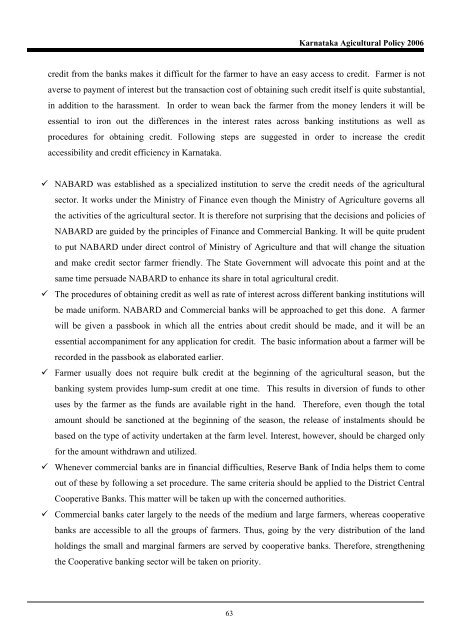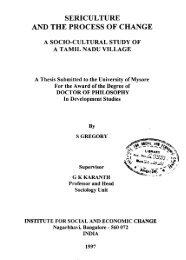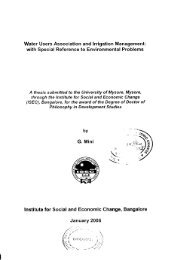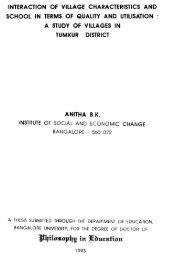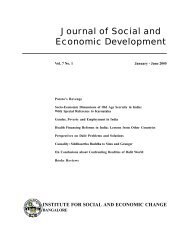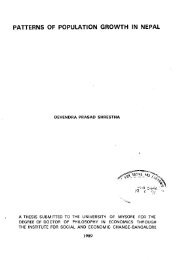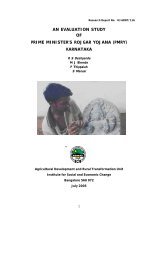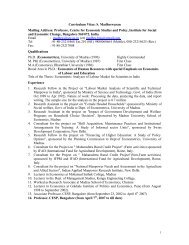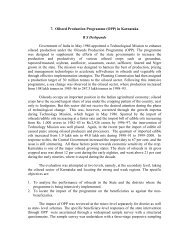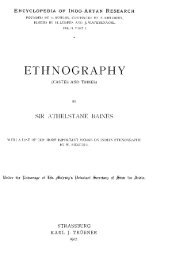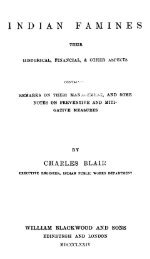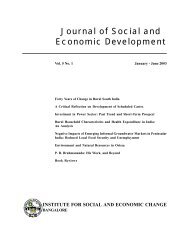Karnataka Agricultural Policy - Institute for Social and Economic ...
Karnataka Agricultural Policy - Institute for Social and Economic ...
Karnataka Agricultural Policy - Institute for Social and Economic ...
Create successful ePaper yourself
Turn your PDF publications into a flip-book with our unique Google optimized e-Paper software.
<strong>Karnataka</strong> Agicultural <strong>Policy</strong> 2006<br />
credit from the banks makes it difficult <strong>for</strong> the farmer to have an easy access to credit. Farmer is not<br />
averse to payment of interest but the transaction cost of obtaining such credit itself is quite substantial,<br />
in addition to the harassment. In order to wean back the farmer from the money lenders it will be<br />
essential to iron out the differences in the interest rates across banking institutions as well as<br />
procedures <strong>for</strong> obtaining credit. Following steps are suggested in order to increase the credit<br />
accessibility <strong>and</strong> credit efficiency in <strong>Karnataka</strong>.<br />
NABARD was established as a specialized institution to serve the credit needs of the agricultural<br />
sector. It works under the Ministry of Finance even though the Ministry of Agriculture governs all<br />
the activities of the agricultural sector. It is there<strong>for</strong>e not surprising that the decisions <strong>and</strong> policies of<br />
NABARD are guided by the principles of Finance <strong>and</strong> Commercial Banking. It will be quite prudent<br />
to put NABARD under direct control of Ministry of Agriculture <strong>and</strong> that will change the situation<br />
<strong>and</strong> make credit sector farmer friendly. The State Government will advocate this point <strong>and</strong> at the<br />
same time persuade NABARD to enhance its share in total agricultural credit.<br />
The procedures of obtaining credit as well as rate of interest across different banking institutions will<br />
be made uni<strong>for</strong>m. NABARD <strong>and</strong> Commercial banks will be approached to get this done. A farmer<br />
will be given a passbook in which all the entries about credit should be made, <strong>and</strong> it will be an<br />
essential accompaniment <strong>for</strong> any application <strong>for</strong> credit. The basic in<strong>for</strong>mation about a farmer will be<br />
recorded in the passbook as elaborated earlier.<br />
Farmer usually does not require bulk credit at the beginning of the agricultural season, but the<br />
banking system provides lump-sum credit at one time. This results in diversion of funds to other<br />
uses by the farmer as the funds are available right in the h<strong>and</strong>. There<strong>for</strong>e, even though the total<br />
amount should be sanctioned at the beginning of the season, the release of instalments should be<br />
based on the type of activity undertaken at the farm level. Interest, however, should be charged only<br />
<strong>for</strong> the amount withdrawn <strong>and</strong> utilized.<br />
Whenever commercial banks are in financial difficulties, Reserve Bank of India helps them to come<br />
out of these by following a set procedure. The same criteria should be applied to the District Central<br />
Cooperative Banks. This matter will be taken up with the concerned authorities.<br />
Commercial banks cater largely to the needs of the medium <strong>and</strong> large farmers, whereas cooperative<br />
banks are accessible to all the groups of farmers. Thus, going by the very distribution of the l<strong>and</strong><br />
holdings the small <strong>and</strong> marginal farmers are served by cooperative banks. There<strong>for</strong>e, strengthening<br />
the Cooperative banking sector will be taken on priority.<br />
63


